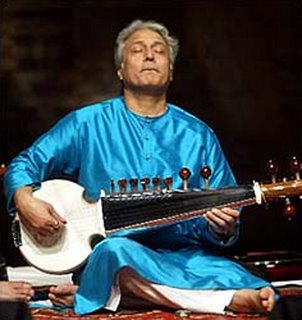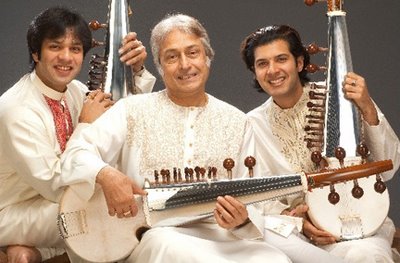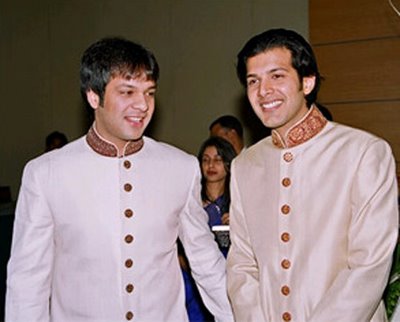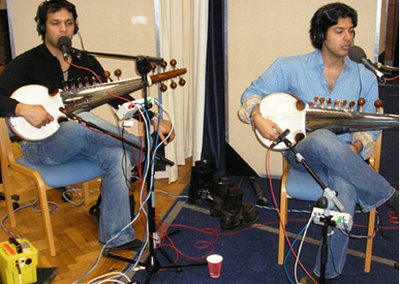Ustad Amjad Ali Khan with Amaan and Ayaan
The Dalai Lama sent his blessings and good wishes to his friend Ustad Amjad Ali Khan and his sons, and to the audience to enjoy the beautiful music last Saturday. It was an apt beginning, since, as Amjad Ali Khan Sahib said in the program notes, you can't be abusive or tell a lie through pure sound.
 As this is the centennial year of the launch of the Satyagraha Movement, he started his solo with a tribute to Mahatma Gandhi in the form of two songs, Vaishnav Janato, in Raga Khammaj, and Ram Dhun, in Raga Ghara. The alaap, or first movement, which is an exploration of the notes without tabla, was brief and lamenting, but by the jhala or third movement, Ram Dhun was ringing out with both sets of tabla in a fourteen beat cycle, like Satyagraha gathering force.
As this is the centennial year of the launch of the Satyagraha Movement, he started his solo with a tribute to Mahatma Gandhi in the form of two songs, Vaishnav Janato, in Raga Khammaj, and Ram Dhun, in Raga Ghara. The alaap, or first movement, which is an exploration of the notes without tabla, was brief and lamenting, but by the jhala or third movement, Ram Dhun was ringing out with both sets of tabla in a fourteen beat cycle, like Satyagraha gathering force.
The extraordinary warmth and clarity of the acoustics at Carnegie Hall make a real treat even better. The views are fine, too. Again with the bird binoculars, I watched closely as he launched into Raga Kamod and both Tabla masters began to develop complex time schemes in ten and fourteen beat cycles. I saw that the heavy silk electric blue kurta that the maestro wore (not the one above) was self-embroidered with butis and that a truly fine painted antique shawl lay over his feet. The beautiful tanpura player with parted bangs glittered softly in self-beaded black while keeping the true tonic on the tambura and "sympathizing" with style and humor. Samir Chatterjee, tabla master of the Farrukhabad style, had on a kurta printed with tablas. Opposite, tabla master Sukhvinder Singh, (see video), a disciple of the great Kishan Maharaj of Varanasi, and also a recording partner of Ry Cooder, wore a less innovative but nevertheless fine embroidered cream silk kurta. The rug seemed to be a huge old Bokhara. Amjad Ali Khan Sahib explained that his father had invented the technique of playing the fretless sarod with his nails, rather than by holding down notes with his fingertips. This is how he makes his instrument weep and sing like a human voice with an impossible range.
He and his sons, who are also his disciples, are the First Family of the Sarod and comprise the sixth and seventh generation of the Senia Bangash Gharana, named after their family. Their ancestor brought an instrument called the rabab to India from Afghanistan in the 18th Century, which the family developed into the sarod in India. When Amman (left) and Ayaan (right) came onstage, they both exuded glamor, but there was no mistaking the star quality of the baby of the family. They each gave their first public performances at eight, and are closely matched as performers, though with completely different styles and sarod voices. Amman wore watermelon silk with a panel of pale gold zirdosi work. Ayaan, who ran his fingers through his hair in the manner of a Doon school boy, yet still landed on the time cycle with panache. wore sapphire blue with the darker gold zirdosi work hanging stalactites off his shoulders. Yes, they have a new hit album called Reincarnation (hear a clip at the link), and a video to go with it, both topping the Indian charts for thirteen weeks, and yes, they've played electronica with ex-Allman Brothers Band member Derek Trucks, and played every possible venue worldwide. They showed their youthful brilliance onstage, interspersing their family technique with the use of their fingertips, sometimes to strongly percussive effect. I have never heard two sarods played at once before; the effect of two powerful musicians playing an evening raga at fast tempo was electrifying. Then Ayaan anounced his father's return to the stage, saying he would never play after him.
When Amman (left) and Ayaan (right) came onstage, they both exuded glamor, but there was no mistaking the star quality of the baby of the family. They each gave their first public performances at eight, and are closely matched as performers, though with completely different styles and sarod voices. Amman wore watermelon silk with a panel of pale gold zirdosi work. Ayaan, who ran his fingers through his hair in the manner of a Doon school boy, yet still landed on the time cycle with panache. wore sapphire blue with the darker gold zirdosi work hanging stalactites off his shoulders. Yes, they have a new hit album called Reincarnation (hear a clip at the link), and a video to go with it, both topping the Indian charts for thirteen weeks, and yes, they've played electronica with ex-Allman Brothers Band member Derek Trucks, and played every possible venue worldwide. They showed their youthful brilliance onstage, interspersing their family technique with the use of their fingertips, sometimes to strongly percussive effect. I have never heard two sarods played at once before; the effect of two powerful musicians playing an evening raga at fast tempo was electrifying. Then Ayaan anounced his father's return to the stage, saying he would never play after him.
 The brothers in Mumbai, August 2005, at the launch of their album, Reincarnation; An Electronic Odyssey
The brothers in Mumbai, August 2005, at the launch of their album, Reincarnation; An Electronic Odyssey
With father and sons playing variations on folk ballads, the simpler, familiar forms made for a gentle but rousing evocation (for me) of Baul singers -- if only because I've never heard Bihu from Assam. The concluding Carnatic Raga Mishra Kirwani was evocative too, as I've been watching Bharat Natyam lately. For the jhala, Amaan and Ayaan started echoing their father's phrases in an alternating dialogue, eventually playing in unison with him for a resounding conclusion. In closing, Amjad Ali Khan Sahib reminded the audience that in Indian classical music everything is improvised; the performance is not rehearsed. He thanked his wife, who was in the audience, then presented the musicians and thanked his tanpura player especially.
Ustad Amjad Ali Khan's most recent album, Moksha, was released by Real World Records.
Amaan Ali Khan and Ayaan Ali Khan (aka The Bangash Brothers, below) recording at the at the BBC Mailbox Studios. They recently published a book about their father called Abba... God's Greatest Gift to Us

 As this is the centennial year of the launch of the Satyagraha Movement, he started his solo with a tribute to Mahatma Gandhi in the form of two songs, Vaishnav Janato, in Raga Khammaj, and Ram Dhun, in Raga Ghara. The alaap, or first movement, which is an exploration of the notes without tabla, was brief and lamenting, but by the jhala or third movement, Ram Dhun was ringing out with both sets of tabla in a fourteen beat cycle, like Satyagraha gathering force.
As this is the centennial year of the launch of the Satyagraha Movement, he started his solo with a tribute to Mahatma Gandhi in the form of two songs, Vaishnav Janato, in Raga Khammaj, and Ram Dhun, in Raga Ghara. The alaap, or first movement, which is an exploration of the notes without tabla, was brief and lamenting, but by the jhala or third movement, Ram Dhun was ringing out with both sets of tabla in a fourteen beat cycle, like Satyagraha gathering force.The extraordinary warmth and clarity of the acoustics at Carnegie Hall make a real treat even better. The views are fine, too. Again with the bird binoculars, I watched closely as he launched into Raga Kamod and both Tabla masters began to develop complex time schemes in ten and fourteen beat cycles. I saw that the heavy silk electric blue kurta that the maestro wore (not the one above) was self-embroidered with butis and that a truly fine painted antique shawl lay over his feet. The beautiful tanpura player with parted bangs glittered softly in self-beaded black while keeping the true tonic on the tambura and "sympathizing" with style and humor. Samir Chatterjee, tabla master of the Farrukhabad style, had on a kurta printed with tablas. Opposite, tabla master Sukhvinder Singh, (see video), a disciple of the great Kishan Maharaj of Varanasi, and also a recording partner of Ry Cooder, wore a less innovative but nevertheless fine embroidered cream silk kurta. The rug seemed to be a huge old Bokhara. Amjad Ali Khan Sahib explained that his father had invented the technique of playing the fretless sarod with his nails, rather than by holding down notes with his fingertips. This is how he makes his instrument weep and sing like a human voice with an impossible range.
He and his sons, who are also his disciples, are the First Family of the Sarod and comprise the sixth and seventh generation of the Senia Bangash Gharana, named after their family. Their ancestor brought an instrument called the rabab to India from Afghanistan in the 18th Century, which the family developed into the sarod in India.
 When Amman (left) and Ayaan (right) came onstage, they both exuded glamor, but there was no mistaking the star quality of the baby of the family. They each gave their first public performances at eight, and are closely matched as performers, though with completely different styles and sarod voices. Amman wore watermelon silk with a panel of pale gold zirdosi work. Ayaan, who ran his fingers through his hair in the manner of a Doon school boy, yet still landed on the time cycle with panache. wore sapphire blue with the darker gold zirdosi work hanging stalactites off his shoulders. Yes, they have a new hit album called Reincarnation (hear a clip at the link), and a video to go with it, both topping the Indian charts for thirteen weeks, and yes, they've played electronica with ex-Allman Brothers Band member Derek Trucks, and played every possible venue worldwide. They showed their youthful brilliance onstage, interspersing their family technique with the use of their fingertips, sometimes to strongly percussive effect. I have never heard two sarods played at once before; the effect of two powerful musicians playing an evening raga at fast tempo was electrifying. Then Ayaan anounced his father's return to the stage, saying he would never play after him.
When Amman (left) and Ayaan (right) came onstage, they both exuded glamor, but there was no mistaking the star quality of the baby of the family. They each gave their first public performances at eight, and are closely matched as performers, though with completely different styles and sarod voices. Amman wore watermelon silk with a panel of pale gold zirdosi work. Ayaan, who ran his fingers through his hair in the manner of a Doon school boy, yet still landed on the time cycle with panache. wore sapphire blue with the darker gold zirdosi work hanging stalactites off his shoulders. Yes, they have a new hit album called Reincarnation (hear a clip at the link), and a video to go with it, both topping the Indian charts for thirteen weeks, and yes, they've played electronica with ex-Allman Brothers Band member Derek Trucks, and played every possible venue worldwide. They showed their youthful brilliance onstage, interspersing their family technique with the use of their fingertips, sometimes to strongly percussive effect. I have never heard two sarods played at once before; the effect of two powerful musicians playing an evening raga at fast tempo was electrifying. Then Ayaan anounced his father's return to the stage, saying he would never play after him. The brothers in Mumbai, August 2005, at the launch of their album, Reincarnation; An Electronic Odyssey
The brothers in Mumbai, August 2005, at the launch of their album, Reincarnation; An Electronic OdysseyWith father and sons playing variations on folk ballads, the simpler, familiar forms made for a gentle but rousing evocation (for me) of Baul singers -- if only because I've never heard Bihu from Assam. The concluding Carnatic Raga Mishra Kirwani was evocative too, as I've been watching Bharat Natyam lately. For the jhala, Amaan and Ayaan started echoing their father's phrases in an alternating dialogue, eventually playing in unison with him for a resounding conclusion. In closing, Amjad Ali Khan Sahib reminded the audience that in Indian classical music everything is improvised; the performance is not rehearsed. He thanked his wife, who was in the audience, then presented the musicians and thanked his tanpura player especially.
Ustad Amjad Ali Khan's most recent album, Moksha, was released by Real World Records.
Amaan Ali Khan and Ayaan Ali Khan (aka The Bangash Brothers, below) recording at the at the BBC Mailbox Studios. They recently published a book about their father called Abba... God's Greatest Gift to Us


<< Home